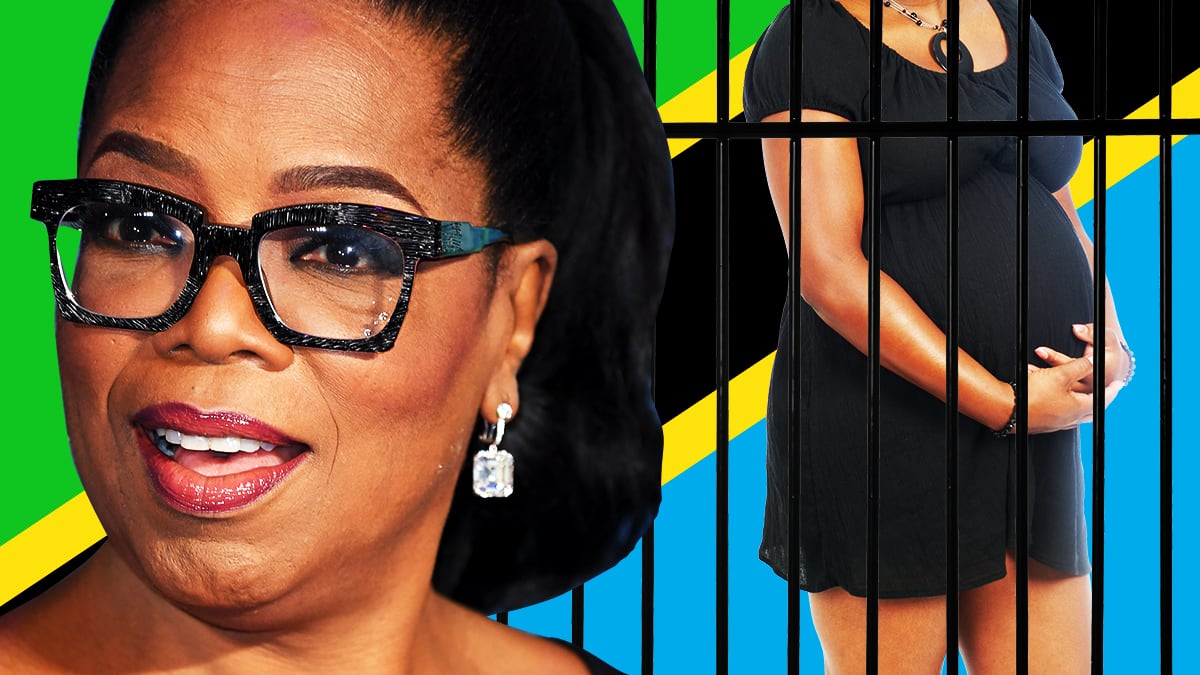ABUJA, Nigeria—Three weeks after Ester Ulimwengu’s niece, Sophia, was nearly sent to jail in Tanzania’s Tandahimba District for becoming pregnant as a schoolgirl, the teenager saw a video of the much-discussed Oprah Winfrey speech at the 2018 Golden Globes Awards. She thought the celebrity could help girls like her in this East African nation.
Watching on Ulimwengu’s phone as Oprah received the Cecil B. DeMille Award, Sophia, who is in her final year at secondary school, felt included in the American's acceptance speech, especially when she heard her say that the story of women this year is “one that transcends any culture, geography, race, religion, politics or workplace.”
“She [Sophia] felt carried along and even asked me, ‘Does Oprah know what's happening to girls in Tanzania?’” Ulimwengu told The Daily Beast during her visit to Abuja, Nigeria’s capital, at the start of March. “Before I could respond, she said, ‘It would be nice to hear Oprah talk specifically about the situation of pregnant schoolgirls in Tanzania.’”
ADVERTISEMENT
Tanzanian authorities have vowed to exclude pregnant girls from formal education despite huge outrage from many quarters, including opposition politicians. The country’s president, John Magufuli, insists that no pregnant girl will be allowed to attend classes in a state school, nor will they be readmitted after giving birth.
Sophia witnessed the crackdown firsthand when policemen attempted to arrest her after it was reported to them that she had become pregnant while still in school. Her aunt, Ulimwengu, who is a freelance journalist and a girls’ rights advocate in Tanzania, resisted their attempt to take her away and, perhaps, “send her to prison.”
“I said [to the police] ‘you can’t take her away because she has done nothing that demands arrest,’” Ulimwengu said. “I said I will take them to court [if they arrested Sophia].”
Before attempts were made to arrest Sophia, who was impregnated by a man in whose home she often worked as a house cleaner, the police had arrested five pregnant schoolgirls in the same district and were on the hunt for the men responsible for the pregnancies. The girls—aged between 16 and 19—were later released on bail to their parents.
A controversial law that dates back to the 1960s allows government schools in Tanzania to ban young mothers from attending classes. Another law passed about 16 years ago allows girls to be expelled from school for getting pregnant. Over the past decade more than 55,000 pregnant students were expelled or forced to drop out of school, according to a 2013 report by the Center for Reproductive Rights (PDF).
“The act of expelling pregnant girls sends the wrong message entirely,” Tanzanian singer and women’s rights advocate Ada—who was just crowned the Miss Face of East Africa in London—told The Daily Beast. “Being pregnant should not mean you can no longer be an active and valuable member of society and expelling these girls robs them from a future beyond potential motherhood.”
The discrimination doesn’t stop at the school doors—it also extends to where they live. Human Rights Watch (HRW) said it found evidence in recent years that showed that pregnant girls in Tanzania “were discriminated against and isolated at the school level, and in their communities.”
“Once a girl is pregnant, she risks losing her family’s support,” Elin Martinez, a researcher at HRW Children’s Rights Division, told The Daily Beast. “Our findings show that, once out of school, many girls are exposed to abuse, as well and harmful and exploitative labour, or live with their child in very precarious conditions.”
In general, Tanzania has a very high teenage pregnancy rate which, in some ways, can be blamed on the country’s Marriage Act of 1971 that sets the minimum marriage age for girls at 15 (with parental consent) and at 18 for boys. The law allows 14-year-old children to get married when a court is satisfied that special (but undefined) circumstances exist.
Across the country, two out of five girls marry before their 18th birthday and one in four girls and women aged 15 to 19 are mothers, according to the 2015-2016 Tanzania Demographic and Health Survey. Those who become pregnant while in school can be expelled and excluded from formal education for "offences against morality" and "wedlock," according to an unpopular 2002 law which the government is enforcing throughout the country.
“This policy connotes that all young girls who are pregnant are engaging in sex willingly,” said Ada, who will be unveiling a new project later in the year to support the women’s rights movement globally. “The reality could be, for a lot of these young girls, that they have been victims of sexual violence and/or arranged marriages which often lead to pregnancy.”
As a way of ending teenage pregnancies that lead to school dropouts, President Magufuli said last year that men who impregnate the schoolgirls should be imprisoned for 30 years and “put the energy they used to impregnate the girl into farming while in jail.”
At a public rally last June in Chalinze town, west of the capital of Dar es Salaam, the president warned schoolgirls, “As long as I am president, no pregnant student will be allowed to return to school… We cannot allow this immoral behavior to permeate our primary and secondary schools. After getting pregnant, you are done.”
In Magufuli’s view, girls who give birth to children will be distracted from their studies and will be a bad influence on other girls in the classroom. “After calculating some mathematics, she’d be asking the teacher in the classroom, ‘Let me go out and breastfeed my crying baby,’” he said.
“The president’s comments, and action to isolate pregnant girls, is very harmful and highly discriminatory,” Martinez, who has conducted research and advocacy on the barriers to inclusive primary and secondary education in Tanzania, said. “By arbitrarily deciding to end girls’ education, the President has jeopardized many thousands of teenage girls’ education prospects, which will also affect their children’s futures.”
A number of organizations, including HRW, have tried in vain to get the government to reverse the ban on education for pregnant girls. The victims are now looking to global figures like Oprah, who, at the Golden Globes, was “especially proud and inspired by all the women who have felt strong enough and empowered enough to speak up and share their personal stories.”
In Oprah’s now-famous speech, she praised “all the women who have endured years of abuse and assault” because they had “bills to pay and dreams to pursue.” Little did she know that she was speaking about girls like Sophia, who tolerated abuse at the hands of her benefactor because she needed to fund her schooling and support her siblings after losing her father to illness a decade ago.
Now, Sophia and students in her situation, whom Ulimwengu is fighting for, want Oprah to speak up for girls in Tanzania who have been denied the chance to continue their education because they became pregnant while in school.
“She is well-respected not just in her country, but here in Africa as well,” Ulimwengu said of the American talk-show host, who founded the Oprah Winfrey Leadership Academy for Girls, which is providing educational and leadership opportunities for thousands of schoolgirls in South Africa. “Sophia and the other girls are hoping she can fight for them.”
The Daily Beast contacted Oprah for comment on the situation of Sophia and other pregnant schoolgirls in Tanzania, but her representatives have yet to respond.






